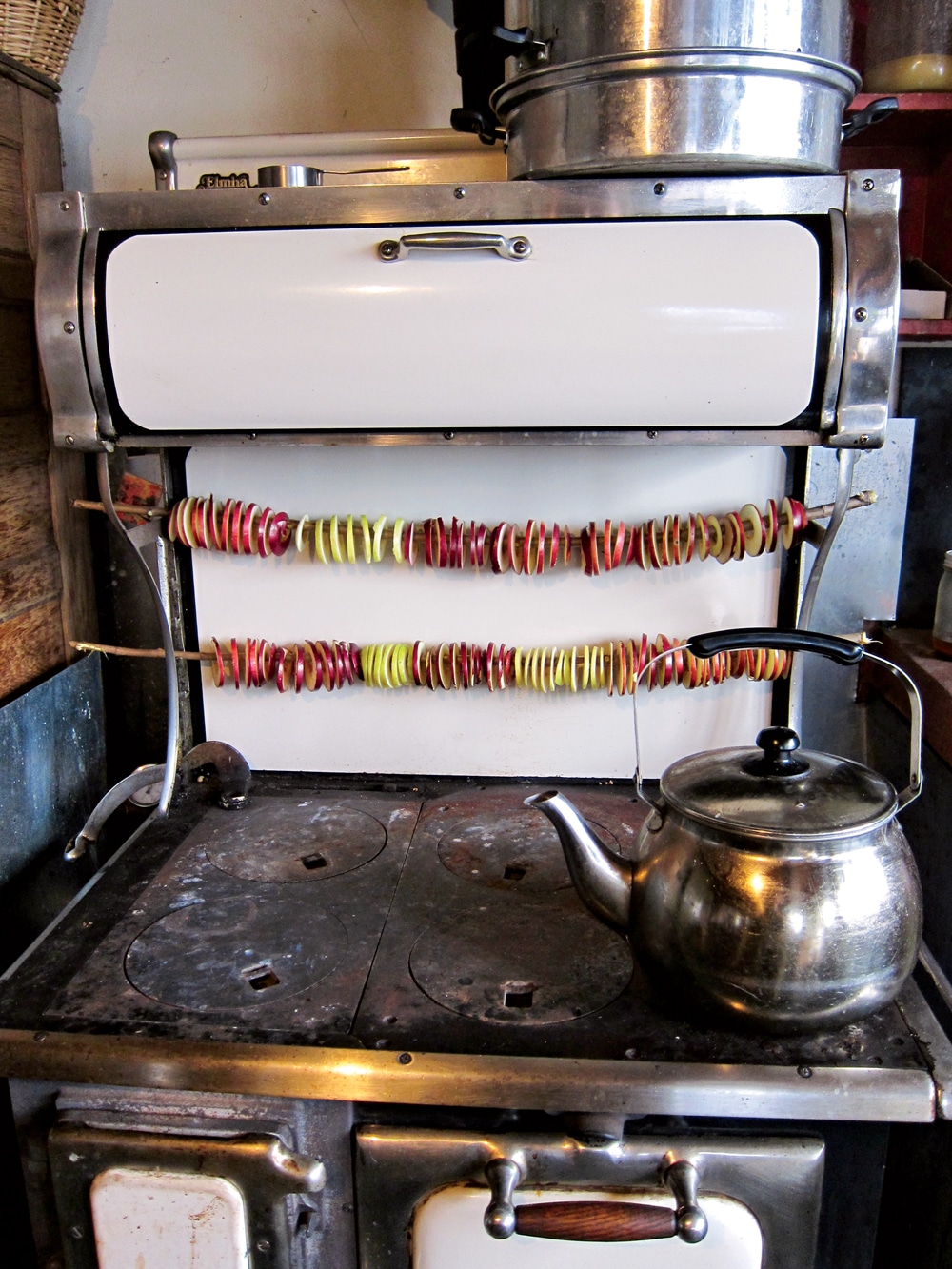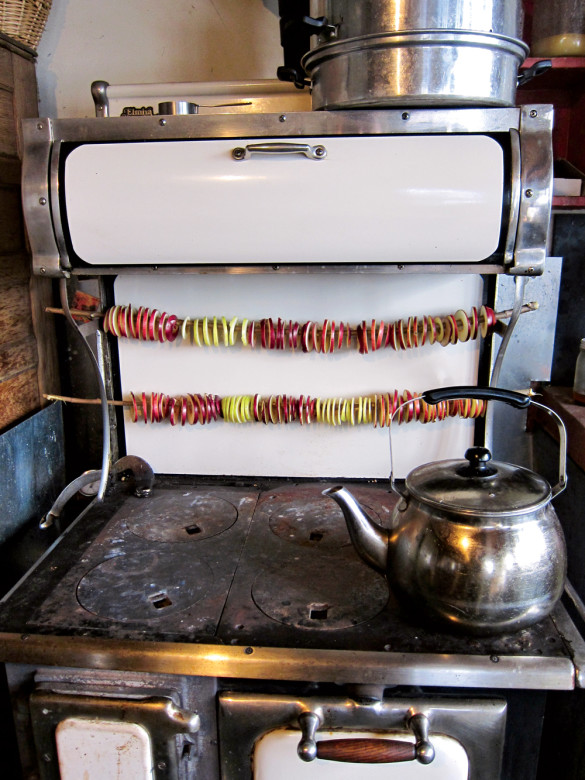The Hurry-Up Season | Life in the Kingdom
As the days get shorter, the list of chores grows longer.

In an effort to stockpile enough snacks to last their boys through winter, the Hewitts slice and dry foraged apples in autumn.
Photo Credit : Penny Hewitt
Photo Credit : Penny Hewitt
The shortening of the daylight hours takes me by surprise every autumn, perhaps in part because it comes at precisely the wrong time for us. In no other season is there more urgency in the air; September and October offer the last chance for reliably good (or at least not horrendously bad) weather in which to check off the list of tasks we’ll never reach the end of. Indeed, it often seems as if we add new tasks faster than old tasks are completed, and it occurs to me that were I a mathematician, I could probably develop an equation to demonstrate the precise disparity between the rate of adding tasks and the rate of completing tasks. For some reason, this depresses me.
Truth be told, I am not much of a list maker. I find them an unwelcome reminder of all that remains undone—and besides, does not the list itself become yet another chore demanding my attention? Must I now add “make a list” to my list? And oh, how many lists have I lost, how many precious hours of my too-short life frittered away frantically searching until the list is finally plucked from the wallet pocket of my rain-soaked Carhartts, the ink having succumbed to the moisture so that Finish cow gate looks something like Fin is sow mate. (My son Fin does not find this nearly as humorous as I do.)
My wife, Penny, on the other hand, is a list maker of unequaled commitment and expertise. She could teach university-level list making. Her lists never stray: They are like perfectly trained dogs, always at her beck and call. Furthermore, they are reliably legible, printed neatly onto the backs of junk mail envelopes pulled from the recycling bin (selection of proper list-making materials would come in week two of her class).
Most amazing to me, Penny has an uncanny sense of the proper life-span for a list; she knows when to give up on one and begin another, even if this means transferring tasks between them. Me, I just keep halfheartedly scrawling on the same old list, my printing growing smaller and smaller as I run out of space, until I give up and cram the damn thing into the back pocket of my work pants, where it is forgotten until I am afflicted with the nagging sense that there was actually something important on that list, something I really need to accomplish before the cold settles, something I cannot quite recall, but if only I could find … ah, there it is. Fin is sow mate. Now what could that have been?
At least the weather is on our side. Indeed, it transcends superlatives: day after day after day of azure-blue skies speckled with lazy drifting clouds, a pattern that is interrupted by showers just often enough to keep us from falling into the same drought that’s afflicted much of the Northeast.
On these halcyon mornings, I milk in a T-shirt just as the sun is clearing the copse of spruce to the east. Milking outdoors, kneeling on the ground, we are subject to the vagaries of weather. Halter, fence post, cow, bucket. Sometimes I wish for more commodious infrastructure, but not as often as I’m glad to not have it, because if I had it I’d use it, even on mornings as fine as these—the early slanting light, the smell of sun on cow, the laying hens gathering around me as if this might finally be the morning I do something other than shoo them away. Forever hopeful, those hens. A guy could learn a thing or two.
On the days I’m not checking off tasks on the list I can’t find, I work at a farm a mile down the road, alternating between running our small excavator and laboring on a variety of building projects. The farm is owned by our friend Tom; we drive past it almost every day. It’s situated precisely where the road narrows and curves through a stand of old mother maples. The narrowness of the road, the corner, and the proximity of the big trees compel me to ease off the gas, but truth is, I would do so anyway because there’s almost always an excuse to crane my neck: the muscle-bound draft horses, grazing a roadside paddock; or Tom on the tractor, flipping a towering pile of compost; or the big flock of hopeful laying hens, clucking and pecking and scratching their way around the barnyard. Sometimes Tom’s younger daughter and her friend sell lemonade at the side of the road, and I stop and give them a dollar for a 25-cent cup because I’m a sucker for a lemonade stand on a scarcely traveled gravel road run by a couple of 8-year-olds who wave their arms frantically and shout, “Stop! Ben! Stop!” when I approach.
I like working at Tom’s farm. In part, I like it because I often work with the young man who lives there, in a single room adjacent to the haymow of the barn. His name is John, and he’s 24, and when he’s not working on the farm he logs with the horses grazing that roadside paddock. He smokes hand-rolled cigarettes and keeps a bushy beard that goes smashingly with the grease-stained suspenders holding his pants in place. John is young enough to be my son but seems to already have found his place in the world. He tells me he does not aspire to have a farm of his own; he is happy with his life as it is, the day-in, day-out labor of the farm, the single-room apartment, his team of horses, and the occasional logging job. He thinks of finding a woman who can be similarly content with these modest circumstances (and if she, too, rolls her own, all the better). He realizes this might be a challenge, but he can be patient.
John and I work well together; we are silly and somber in equal measure, and we both like listening to classic rock on the radio. Never, ever underestimate the value of a workmate who likes the same music as you do—though in all honesty I really like classic rock only in particular circumstances, such as when I’m installing clapboards on the gable ends of an old barn, and it’s raining a bit and just cold enough to make me wish it weren’t raining, and I can smell the smoke spiraling off the lit end of my workmate’s hand-rolled cigarette.
I like working at Tom’s farm also because I like the work itself. I am not an especially skilled builder, but I’m competent enough to imagine that I know the pleasure a skilled builder must feel when driving a nail into a piece of wood that fits just so. And though I’m a tad loath to admit it, I sort of like working with machinery, and in particular the excavator, which is a remarkable piece of equipment, capable equally of destruction and production. I take satisfaction in operating the excavator with maximum precision, and sometimes I find myself calculating how many hours it would have taken to do the job by hand, and I marvel anew at the ingenuity of our species.
I do not normally worship at the altar of efficiency, and I understand all too well the ways in which labor-saving devices undermine the sheer pleasure of manual work, along with the experiences and knowledge it confers—not to mention the relationships cultivated around shared work. My time on the excavator is always solo, absent the jobsite banter I value so much. It’s just me and the steady thrum of the diesel engine. Yet it is truly impressive what the machine can accomplish, and to spend less than an hour excavating a water line trench that would have taken me three or more days (and an extra-large bottle of Tylenol) to dig by hand seems worthy of acknowledgement.
Finally, toward the end of October, the fine weather breaks, and on the 23rd we awaken to wind-driven snow, four inches on the ground and mounting, the cows on the wrong side of their sagging fence, browsing the garden for remnants. It’s not yet daylight as we drive them back to their paddock, but the accumulated snow lends its particular luminescence, and we do not need head lamps.
Later, I lay flakes of hay to kneel on for milking, a little prayer mat upon which to repent my sins one squirt at a time. Locked my sister in the closet. Squirt. Snitched one of my father’s Lucky Strikes. Squirt. Snitched another. The snow melts into the heat of Pip’s flanks and the sleeves of my wool jacket. No T-shirt today. No early sunlight falling across my cow and me.
I milk fast, fingers cold, until the bucket is full and my hands ache from the effort. I release Pip from her halter and drape it over the fence post. She ambles back to her mates. I pick up the bucket and walk back through the new-fallen snow to mine.


